Detailed Case Study: Insolvency, Audit Responsibilities, and Finance
VerifiedAdded on 2023/06/11
|29
|7522
|247
Case Study
AI Summary
This assignment presents a case study analyzing several legal and ethical issues related to insolvency, audit responsibilities, and corporate financing. It addresses questions concerning directors' duties in near-insolvency situations, the recovery of assets by liquidators, and the obligations of auditors. The analysis covers scenarios involving dividend payments, asset transfers, and the liability of directors for improper financial management and oversight. Additionally, it examines the responsibility of auditors in maintaining independence and addressing potential breaches of duty. The case study also touches upon the implications of equity and debt financing, and the rights and responsibilities associated with different types of shares. The document is available on Desklib, a platform offering study tools and solved assignments for students.
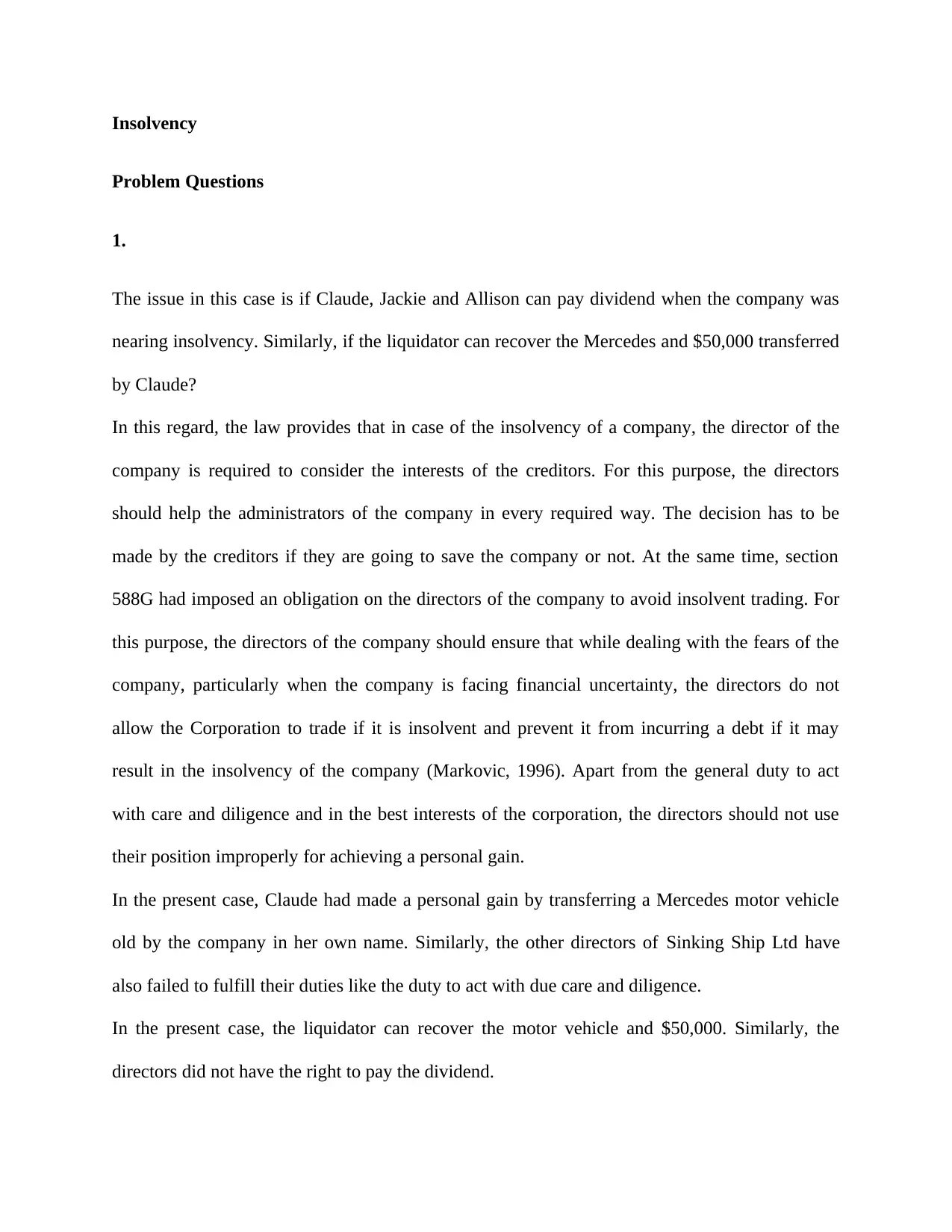
Insolvency
Problem Questions
1.
The issue in this case is if Claude, Jackie and Allison can pay dividend when the company was
nearing insolvency. Similarly, if the liquidator can recover the Mercedes and $50,000 transferred
by Claude?
In this regard, the law provides that in case of the insolvency of a company, the director of the
company is required to consider the interests of the creditors. For this purpose, the directors
should help the administrators of the company in every required way. The decision has to be
made by the creditors if they are going to save the company or not. At the same time, section
588G had imposed an obligation on the directors of the company to avoid insolvent trading. For
this purpose, the directors of the company should ensure that while dealing with the fears of the
company, particularly when the company is facing financial uncertainty, the directors do not
allow the Corporation to trade if it is insolvent and prevent it from incurring a debt if it may
result in the insolvency of the company (Markovic, 1996). Apart from the general duty to act
with care and diligence and in the best interests of the corporation, the directors should not use
their position improperly for achieving a personal gain.
In the present case, Claude had made a personal gain by transferring a Mercedes motor vehicle
old by the company in her own name. Similarly, the other directors of Sinking Ship Ltd have
also failed to fulfill their duties like the duty to act with due care and diligence.
In the present case, the liquidator can recover the motor vehicle and $50,000. Similarly, the
directors did not have the right to pay the dividend.
Problem Questions
1.
The issue in this case is if Claude, Jackie and Allison can pay dividend when the company was
nearing insolvency. Similarly, if the liquidator can recover the Mercedes and $50,000 transferred
by Claude?
In this regard, the law provides that in case of the insolvency of a company, the director of the
company is required to consider the interests of the creditors. For this purpose, the directors
should help the administrators of the company in every required way. The decision has to be
made by the creditors if they are going to save the company or not. At the same time, section
588G had imposed an obligation on the directors of the company to avoid insolvent trading. For
this purpose, the directors of the company should ensure that while dealing with the fears of the
company, particularly when the company is facing financial uncertainty, the directors do not
allow the Corporation to trade if it is insolvent and prevent it from incurring a debt if it may
result in the insolvency of the company (Markovic, 1996). Apart from the general duty to act
with care and diligence and in the best interests of the corporation, the directors should not use
their position improperly for achieving a personal gain.
In the present case, Claude had made a personal gain by transferring a Mercedes motor vehicle
old by the company in her own name. Similarly, the other directors of Sinking Ship Ltd have
also failed to fulfill their duties like the duty to act with due care and diligence.
In the present case, the liquidator can recover the motor vehicle and $50,000. Similarly, the
directors did not have the right to pay the dividend.
Paraphrase This Document
Need a fresh take? Get an instant paraphrase of this document with our AI Paraphraser
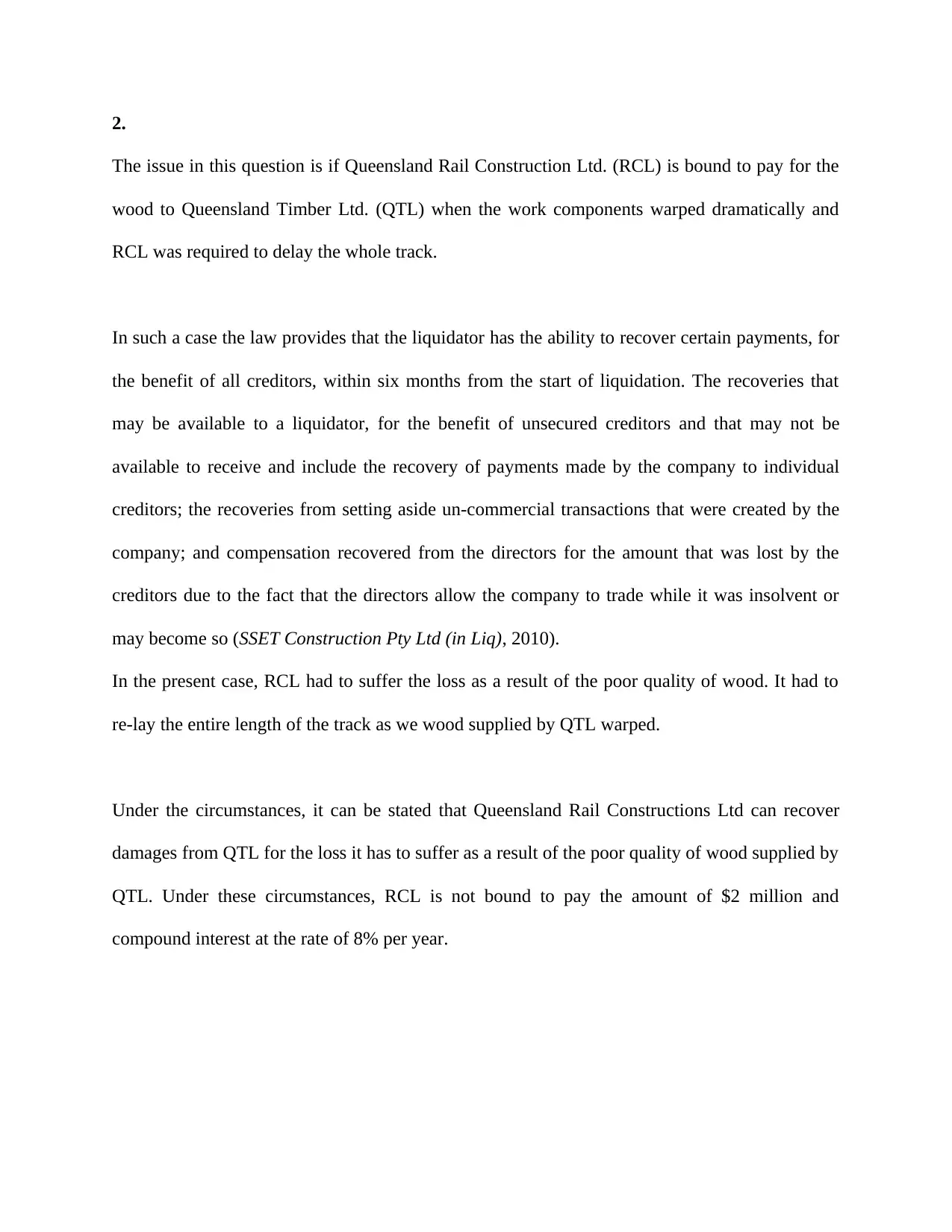
2.
The issue in this question is if Queensland Rail Construction Ltd. (RCL) is bound to pay for the
wood to Queensland Timber Ltd. (QTL) when the work components warped dramatically and
RCL was required to delay the whole track.
In such a case the law provides that the liquidator has the ability to recover certain payments, for
the benefit of all creditors, within six months from the start of liquidation. The recoveries that
may be available to a liquidator, for the benefit of unsecured creditors and that may not be
available to receive and include the recovery of payments made by the company to individual
creditors; the recoveries from setting aside un-commercial transactions that were created by the
company; and compensation recovered from the directors for the amount that was lost by the
creditors due to the fact that the directors allow the company to trade while it was insolvent or
may become so (SSET Construction Pty Ltd (in Liq), 2010).
In the present case, RCL had to suffer the loss as a result of the poor quality of wood. It had to
re-lay the entire length of the track as we wood supplied by QTL warped.
Under the circumstances, it can be stated that Queensland Rail Constructions Ltd can recover
damages from QTL for the loss it has to suffer as a result of the poor quality of wood supplied by
QTL. Under these circumstances, RCL is not bound to pay the amount of $2 million and
compound interest at the rate of 8% per year.
The issue in this question is if Queensland Rail Construction Ltd. (RCL) is bound to pay for the
wood to Queensland Timber Ltd. (QTL) when the work components warped dramatically and
RCL was required to delay the whole track.
In such a case the law provides that the liquidator has the ability to recover certain payments, for
the benefit of all creditors, within six months from the start of liquidation. The recoveries that
may be available to a liquidator, for the benefit of unsecured creditors and that may not be
available to receive and include the recovery of payments made by the company to individual
creditors; the recoveries from setting aside un-commercial transactions that were created by the
company; and compensation recovered from the directors for the amount that was lost by the
creditors due to the fact that the directors allow the company to trade while it was insolvent or
may become so (SSET Construction Pty Ltd (in Liq), 2010).
In the present case, RCL had to suffer the loss as a result of the poor quality of wood. It had to
re-lay the entire length of the track as we wood supplied by QTL warped.
Under the circumstances, it can be stated that Queensland Rail Constructions Ltd can recover
damages from QTL for the loss it has to suffer as a result of the poor quality of wood supplied by
QTL. Under these circumstances, RCL is not bound to pay the amount of $2 million and
compound interest at the rate of 8% per year.
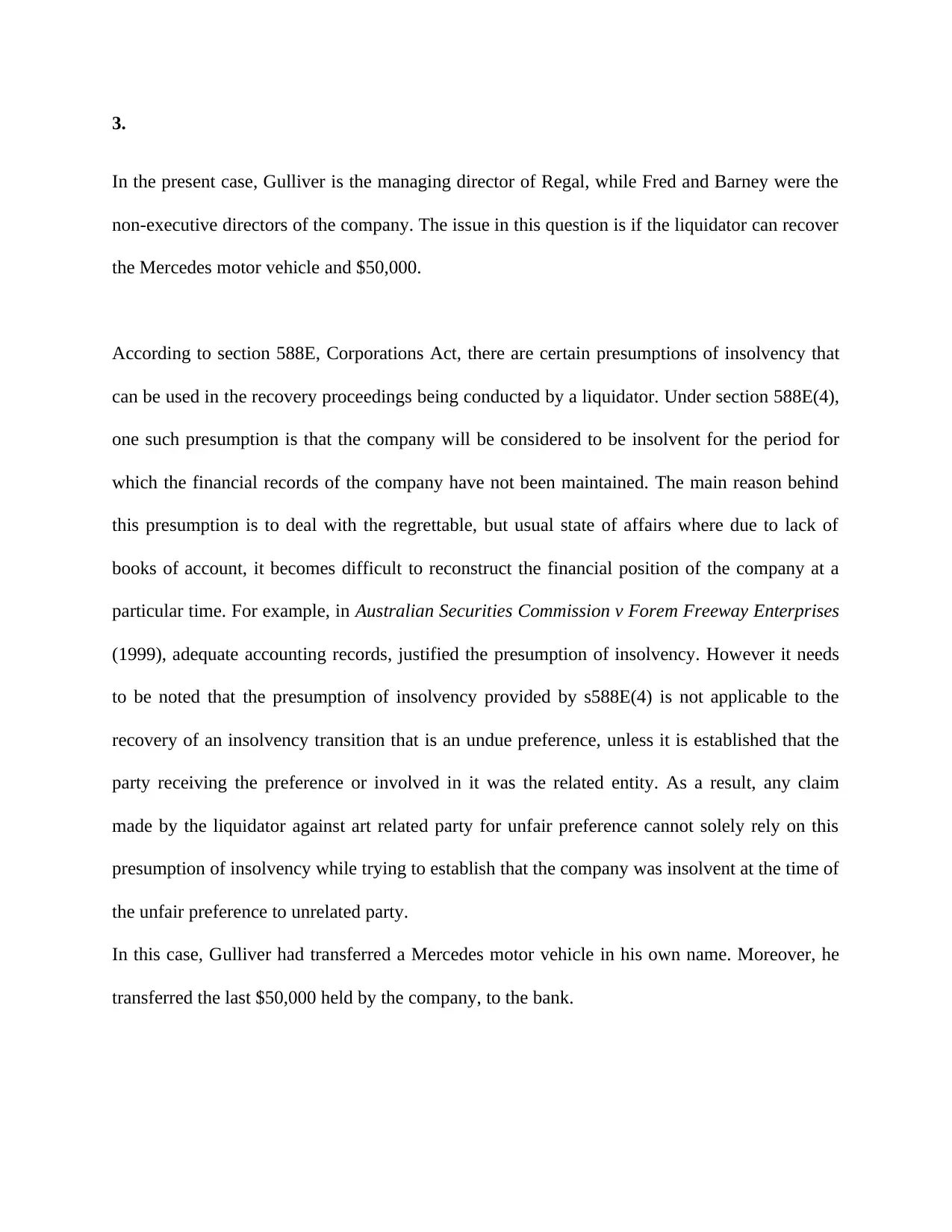
3.
In the present case, Gulliver is the managing director of Regal, while Fred and Barney were the
non-executive directors of the company. The issue in this question is if the liquidator can recover
the Mercedes motor vehicle and $50,000.
According to section 588E, Corporations Act, there are certain presumptions of insolvency that
can be used in the recovery proceedings being conducted by a liquidator. Under section 588E(4),
one such presumption is that the company will be considered to be insolvent for the period for
which the financial records of the company have not been maintained. The main reason behind
this presumption is to deal with the regrettable, but usual state of affairs where due to lack of
books of account, it becomes difficult to reconstruct the financial position of the company at a
particular time. For example, in Australian Securities Commission v Forem Freeway Enterprises
(1999), adequate accounting records, justified the presumption of insolvency. However it needs
to be noted that the presumption of insolvency provided by s588E(4) is not applicable to the
recovery of an insolvency transition that is an undue preference, unless it is established that the
party receiving the preference or involved in it was the related entity. As a result, any claim
made by the liquidator against art related party for unfair preference cannot solely rely on this
presumption of insolvency while trying to establish that the company was insolvent at the time of
the unfair preference to unrelated party.
In this case, Gulliver had transferred a Mercedes motor vehicle in his own name. Moreover, he
transferred the last $50,000 held by the company, to the bank.
In the present case, Gulliver is the managing director of Regal, while Fred and Barney were the
non-executive directors of the company. The issue in this question is if the liquidator can recover
the Mercedes motor vehicle and $50,000.
According to section 588E, Corporations Act, there are certain presumptions of insolvency that
can be used in the recovery proceedings being conducted by a liquidator. Under section 588E(4),
one such presumption is that the company will be considered to be insolvent for the period for
which the financial records of the company have not been maintained. The main reason behind
this presumption is to deal with the regrettable, but usual state of affairs where due to lack of
books of account, it becomes difficult to reconstruct the financial position of the company at a
particular time. For example, in Australian Securities Commission v Forem Freeway Enterprises
(1999), adequate accounting records, justified the presumption of insolvency. However it needs
to be noted that the presumption of insolvency provided by s588E(4) is not applicable to the
recovery of an insolvency transition that is an undue preference, unless it is established that the
party receiving the preference or involved in it was the related entity. As a result, any claim
made by the liquidator against art related party for unfair preference cannot solely rely on this
presumption of insolvency while trying to establish that the company was insolvent at the time of
the unfair preference to unrelated party.
In this case, Gulliver had transferred a Mercedes motor vehicle in his own name. Moreover, he
transferred the last $50,000 held by the company, to the bank.
⊘ This is a preview!⊘
Do you want full access?
Subscribe today to unlock all pages.

Trusted by 1+ million students worldwide
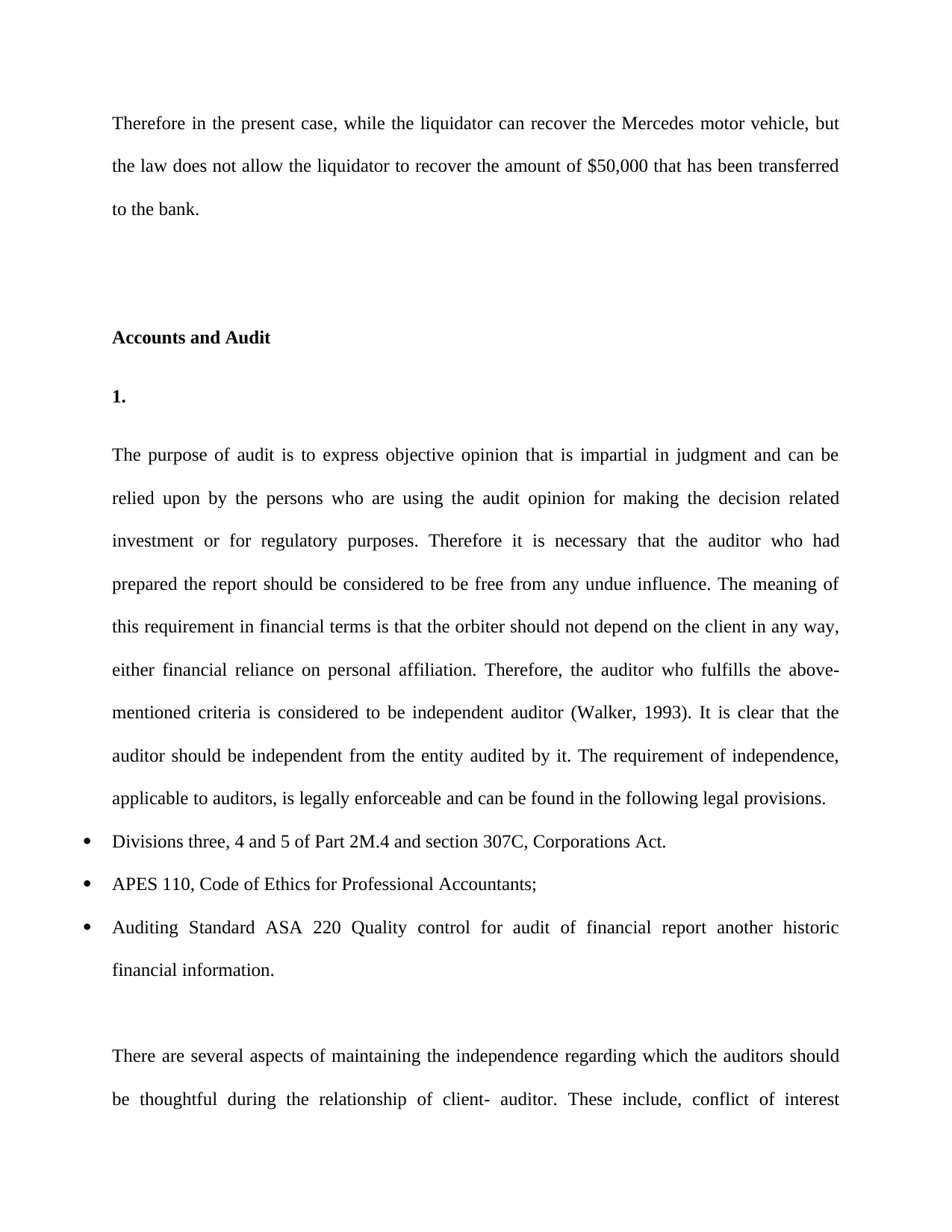
Therefore in the present case, while the liquidator can recover the Mercedes motor vehicle, but
the law does not allow the liquidator to recover the amount of $50,000 that has been transferred
to the bank.
Accounts and Audit
1.
The purpose of audit is to express objective opinion that is impartial in judgment and can be
relied upon by the persons who are using the audit opinion for making the decision related
investment or for regulatory purposes. Therefore it is necessary that the auditor who had
prepared the report should be considered to be free from any undue influence. The meaning of
this requirement in financial terms is that the orbiter should not depend on the client in any way,
either financial reliance on personal affiliation. Therefore, the auditor who fulfills the above-
mentioned criteria is considered to be independent auditor (Walker, 1993). It is clear that the
auditor should be independent from the entity audited by it. The requirement of independence,
applicable to auditors, is legally enforceable and can be found in the following legal provisions.
Divisions three, 4 and 5 of Part 2M.4 and section 307C, Corporations Act.
APES 110, Code of Ethics for Professional Accountants;
Auditing Standard ASA 220 Quality control for audit of financial report another historic
financial information.
There are several aspects of maintaining the independence regarding which the auditors should
be thoughtful during the relationship of client- auditor. These include, conflict of interest
the law does not allow the liquidator to recover the amount of $50,000 that has been transferred
to the bank.
Accounts and Audit
1.
The purpose of audit is to express objective opinion that is impartial in judgment and can be
relied upon by the persons who are using the audit opinion for making the decision related
investment or for regulatory purposes. Therefore it is necessary that the auditor who had
prepared the report should be considered to be free from any undue influence. The meaning of
this requirement in financial terms is that the orbiter should not depend on the client in any way,
either financial reliance on personal affiliation. Therefore, the auditor who fulfills the above-
mentioned criteria is considered to be independent auditor (Walker, 1993). It is clear that the
auditor should be independent from the entity audited by it. The requirement of independence,
applicable to auditors, is legally enforceable and can be found in the following legal provisions.
Divisions three, 4 and 5 of Part 2M.4 and section 307C, Corporations Act.
APES 110, Code of Ethics for Professional Accountants;
Auditing Standard ASA 220 Quality control for audit of financial report another historic
financial information.
There are several aspects of maintaining the independence regarding which the auditors should
be thoughtful during the relationship of client- auditor. These include, conflict of interest
Paraphrase This Document
Need a fresh take? Get an instant paraphrase of this document with our AI Paraphraser
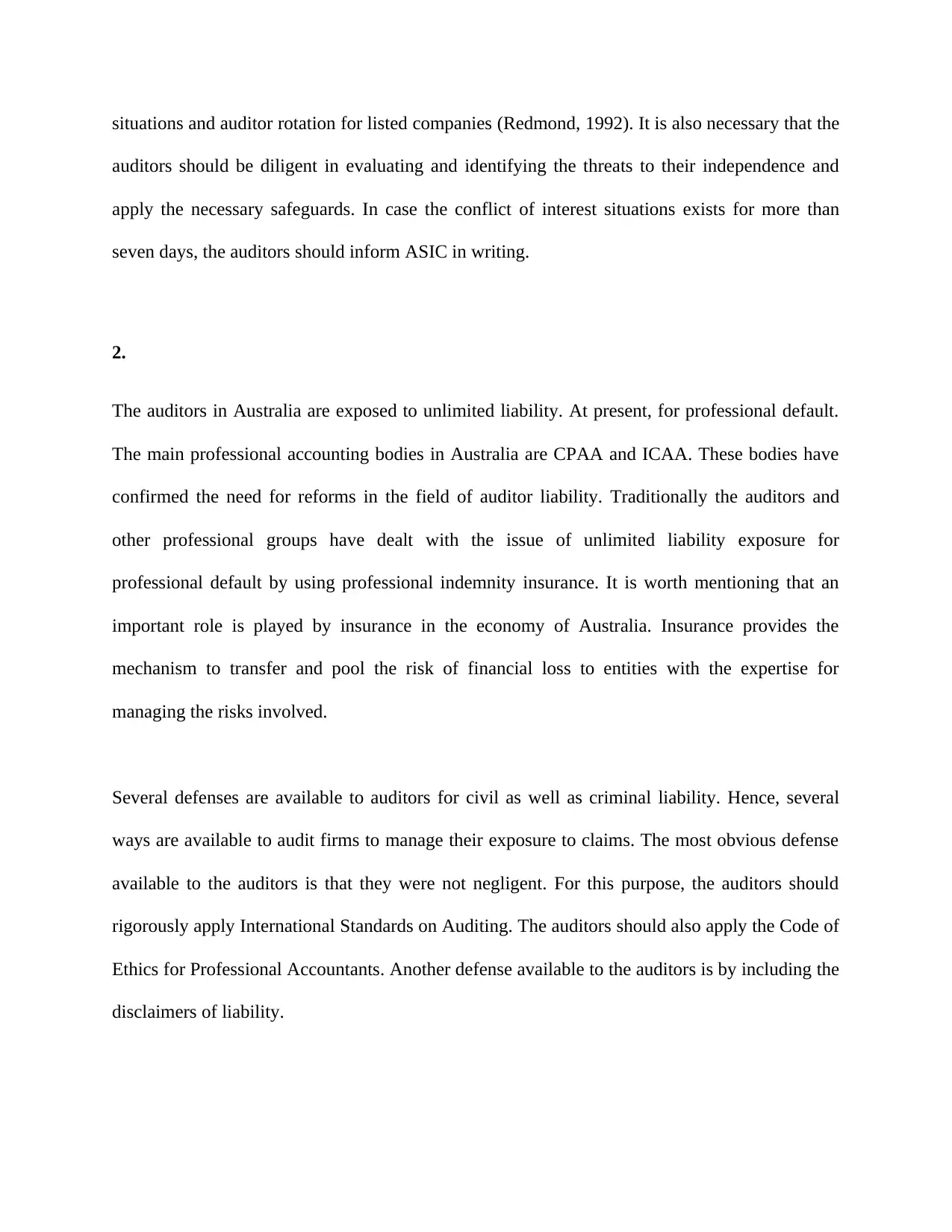
situations and auditor rotation for listed companies (Redmond, 1992). It is also necessary that the
auditors should be diligent in evaluating and identifying the threats to their independence and
apply the necessary safeguards. In case the conflict of interest situations exists for more than
seven days, the auditors should inform ASIC in writing.
2.
The auditors in Australia are exposed to unlimited liability. At present, for professional default.
The main professional accounting bodies in Australia are CPAA and ICAA. These bodies have
confirmed the need for reforms in the field of auditor liability. Traditionally the auditors and
other professional groups have dealt with the issue of unlimited liability exposure for
professional default by using professional indemnity insurance. It is worth mentioning that an
important role is played by insurance in the economy of Australia. Insurance provides the
mechanism to transfer and pool the risk of financial loss to entities with the expertise for
managing the risks involved.
Several defenses are available to auditors for civil as well as criminal liability. Hence, several
ways are available to audit firms to manage their exposure to claims. The most obvious defense
available to the auditors is that they were not negligent. For this purpose, the auditors should
rigorously apply International Standards on Auditing. The auditors should also apply the Code of
Ethics for Professional Accountants. Another defense available to the auditors is by including the
disclaimers of liability.
auditors should be diligent in evaluating and identifying the threats to their independence and
apply the necessary safeguards. In case the conflict of interest situations exists for more than
seven days, the auditors should inform ASIC in writing.
2.
The auditors in Australia are exposed to unlimited liability. At present, for professional default.
The main professional accounting bodies in Australia are CPAA and ICAA. These bodies have
confirmed the need for reforms in the field of auditor liability. Traditionally the auditors and
other professional groups have dealt with the issue of unlimited liability exposure for
professional default by using professional indemnity insurance. It is worth mentioning that an
important role is played by insurance in the economy of Australia. Insurance provides the
mechanism to transfer and pool the risk of financial loss to entities with the expertise for
managing the risks involved.
Several defenses are available to auditors for civil as well as criminal liability. Hence, several
ways are available to audit firms to manage their exposure to claims. The most obvious defense
available to the auditors is that they were not negligent. For this purpose, the auditors should
rigorously apply International Standards on Auditing. The auditors should also apply the Code of
Ethics for Professional Accountants. Another defense available to the auditors is by including the
disclaimers of liability.
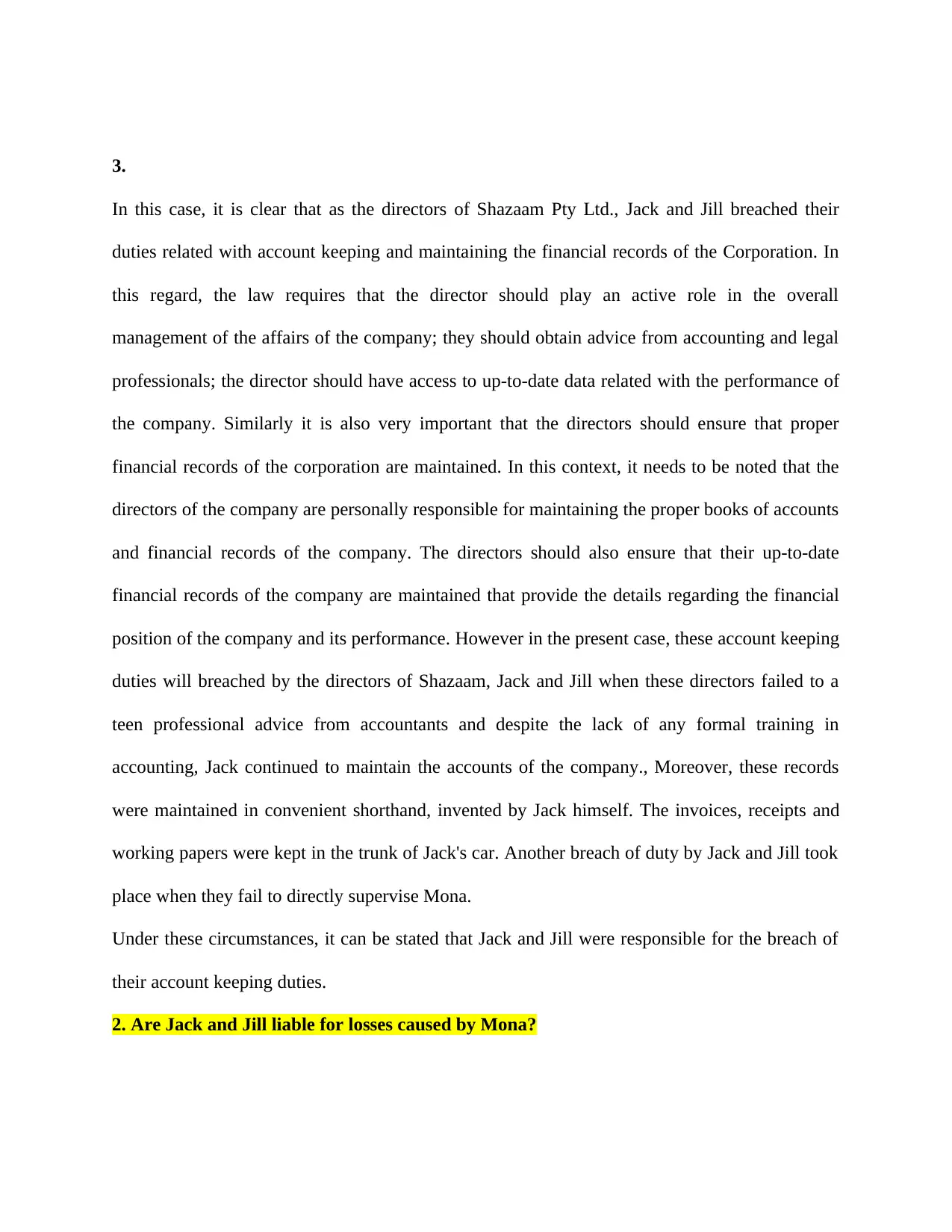
3.
In this case, it is clear that as the directors of Shazaam Pty Ltd., Jack and Jill breached their
duties related with account keeping and maintaining the financial records of the Corporation. In
this regard, the law requires that the director should play an active role in the overall
management of the affairs of the company; they should obtain advice from accounting and legal
professionals; the director should have access to up-to-date data related with the performance of
the company. Similarly it is also very important that the directors should ensure that proper
financial records of the corporation are maintained. In this context, it needs to be noted that the
directors of the company are personally responsible for maintaining the proper books of accounts
and financial records of the company. The directors should also ensure that their up-to-date
financial records of the company are maintained that provide the details regarding the financial
position of the company and its performance. However in the present case, these account keeping
duties will breached by the directors of Shazaam, Jack and Jill when these directors failed to a
teen professional advice from accountants and despite the lack of any formal training in
accounting, Jack continued to maintain the accounts of the company., Moreover, these records
were maintained in convenient shorthand, invented by Jack himself. The invoices, receipts and
working papers were kept in the trunk of Jack's car. Another breach of duty by Jack and Jill took
place when they fail to directly supervise Mona.
Under these circumstances, it can be stated that Jack and Jill were responsible for the breach of
their account keeping duties.
2. Are Jack and Jill liable for losses caused by Mona?
In this case, it is clear that as the directors of Shazaam Pty Ltd., Jack and Jill breached their
duties related with account keeping and maintaining the financial records of the Corporation. In
this regard, the law requires that the director should play an active role in the overall
management of the affairs of the company; they should obtain advice from accounting and legal
professionals; the director should have access to up-to-date data related with the performance of
the company. Similarly it is also very important that the directors should ensure that proper
financial records of the corporation are maintained. In this context, it needs to be noted that the
directors of the company are personally responsible for maintaining the proper books of accounts
and financial records of the company. The directors should also ensure that their up-to-date
financial records of the company are maintained that provide the details regarding the financial
position of the company and its performance. However in the present case, these account keeping
duties will breached by the directors of Shazaam, Jack and Jill when these directors failed to a
teen professional advice from accountants and despite the lack of any formal training in
accounting, Jack continued to maintain the accounts of the company., Moreover, these records
were maintained in convenient shorthand, invented by Jack himself. The invoices, receipts and
working papers were kept in the trunk of Jack's car. Another breach of duty by Jack and Jill took
place when they fail to directly supervise Mona.
Under these circumstances, it can be stated that Jack and Jill were responsible for the breach of
their account keeping duties.
2. Are Jack and Jill liable for losses caused by Mona?
⊘ This is a preview!⊘
Do you want full access?
Subscribe today to unlock all pages.

Trusted by 1+ million students worldwide
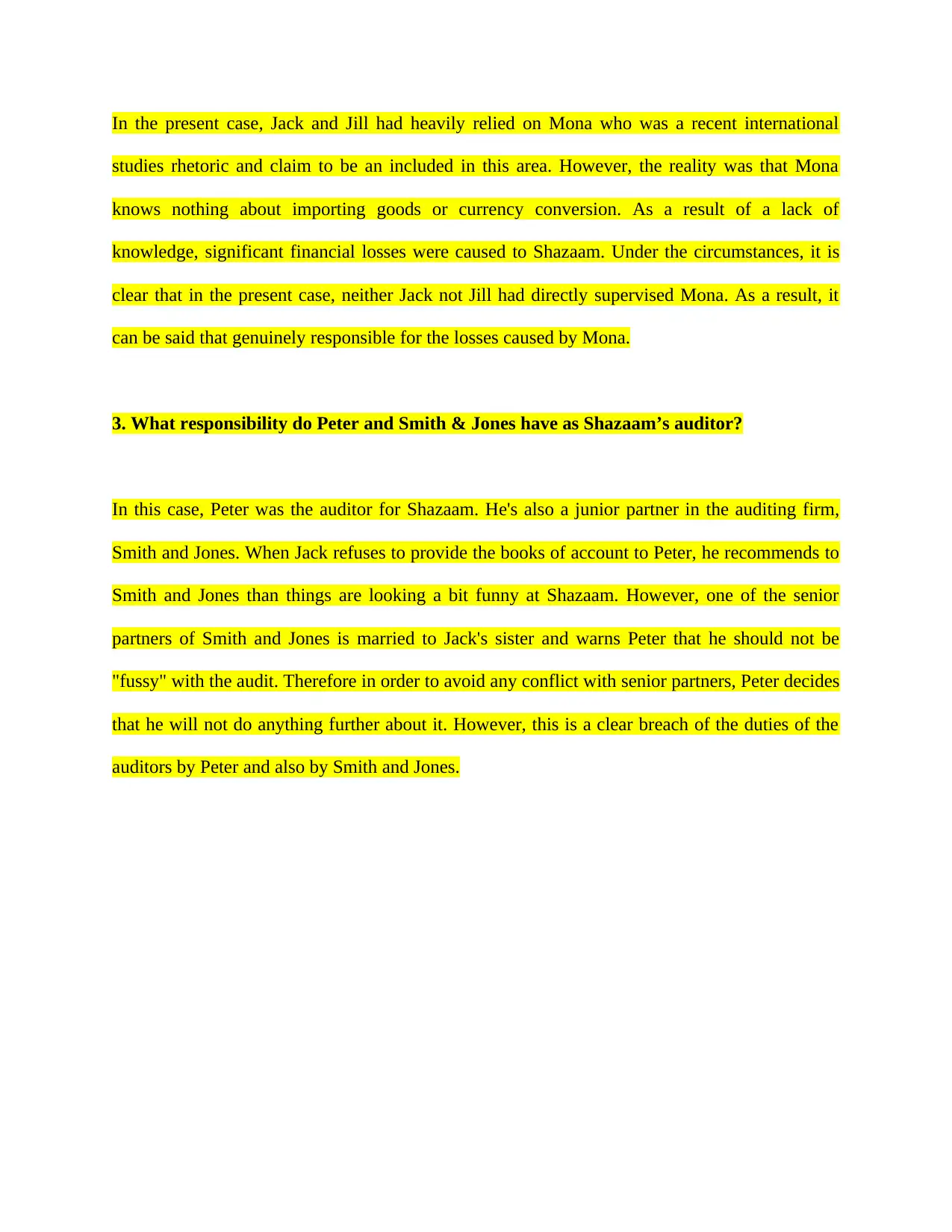
In the present case, Jack and Jill had heavily relied on Mona who was a recent international
studies rhetoric and claim to be an included in this area. However, the reality was that Mona
knows nothing about importing goods or currency conversion. As a result of a lack of
knowledge, significant financial losses were caused to Shazaam. Under the circumstances, it is
clear that in the present case, neither Jack not Jill had directly supervised Mona. As a result, it
can be said that genuinely responsible for the losses caused by Mona.
3. What responsibility do Peter and Smith & Jones have as Shazaam’s auditor?
In this case, Peter was the auditor for Shazaam. He's also a junior partner in the auditing firm,
Smith and Jones. When Jack refuses to provide the books of account to Peter, he recommends to
Smith and Jones than things are looking a bit funny at Shazaam. However, one of the senior
partners of Smith and Jones is married to Jack's sister and warns Peter that he should not be
"fussy" with the audit. Therefore in order to avoid any conflict with senior partners, Peter decides
that he will not do anything further about it. However, this is a clear breach of the duties of the
auditors by Peter and also by Smith and Jones.
studies rhetoric and claim to be an included in this area. However, the reality was that Mona
knows nothing about importing goods or currency conversion. As a result of a lack of
knowledge, significant financial losses were caused to Shazaam. Under the circumstances, it is
clear that in the present case, neither Jack not Jill had directly supervised Mona. As a result, it
can be said that genuinely responsible for the losses caused by Mona.
3. What responsibility do Peter and Smith & Jones have as Shazaam’s auditor?
In this case, Peter was the auditor for Shazaam. He's also a junior partner in the auditing firm,
Smith and Jones. When Jack refuses to provide the books of account to Peter, he recommends to
Smith and Jones than things are looking a bit funny at Shazaam. However, one of the senior
partners of Smith and Jones is married to Jack's sister and warns Peter that he should not be
"fussy" with the audit. Therefore in order to avoid any conflict with senior partners, Peter decides
that he will not do anything further about it. However, this is a clear breach of the duties of the
auditors by Peter and also by Smith and Jones.
Paraphrase This Document
Need a fresh take? Get an instant paraphrase of this document with our AI Paraphraser
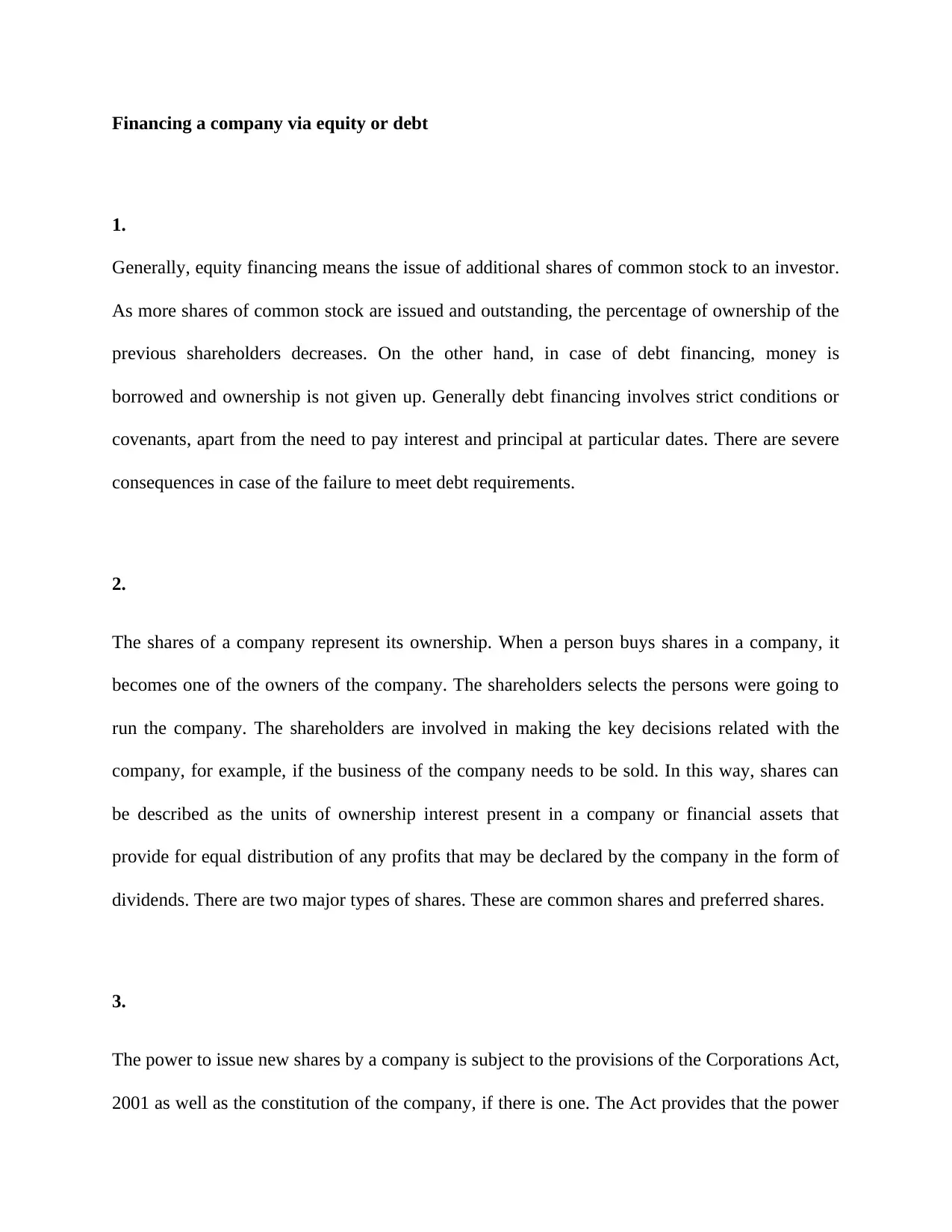
Financing a company via equity or debt
1.
Generally, equity financing means the issue of additional shares of common stock to an investor.
As more shares of common stock are issued and outstanding, the percentage of ownership of the
previous shareholders decreases. On the other hand, in case of debt financing, money is
borrowed and ownership is not given up. Generally debt financing involves strict conditions or
covenants, apart from the need to pay interest and principal at particular dates. There are severe
consequences in case of the failure to meet debt requirements.
2.
The shares of a company represent its ownership. When a person buys shares in a company, it
becomes one of the owners of the company. The shareholders selects the persons were going to
run the company. The shareholders are involved in making the key decisions related with the
company, for example, if the business of the company needs to be sold. In this way, shares can
be described as the units of ownership interest present in a company or financial assets that
provide for equal distribution of any profits that may be declared by the company in the form of
dividends. There are two major types of shares. These are common shares and preferred shares.
3.
The power to issue new shares by a company is subject to the provisions of the Corporations Act,
2001 as well as the constitution of the company, if there is one. The Act provides that the power
1.
Generally, equity financing means the issue of additional shares of common stock to an investor.
As more shares of common stock are issued and outstanding, the percentage of ownership of the
previous shareholders decreases. On the other hand, in case of debt financing, money is
borrowed and ownership is not given up. Generally debt financing involves strict conditions or
covenants, apart from the need to pay interest and principal at particular dates. There are severe
consequences in case of the failure to meet debt requirements.
2.
The shares of a company represent its ownership. When a person buys shares in a company, it
becomes one of the owners of the company. The shareholders selects the persons were going to
run the company. The shareholders are involved in making the key decisions related with the
company, for example, if the business of the company needs to be sold. In this way, shares can
be described as the units of ownership interest present in a company or financial assets that
provide for equal distribution of any profits that may be declared by the company in the form of
dividends. There are two major types of shares. These are common shares and preferred shares.
3.
The power to issue new shares by a company is subject to the provisions of the Corporations Act,
2001 as well as the constitution of the company, if there is one. The Act provides that the power
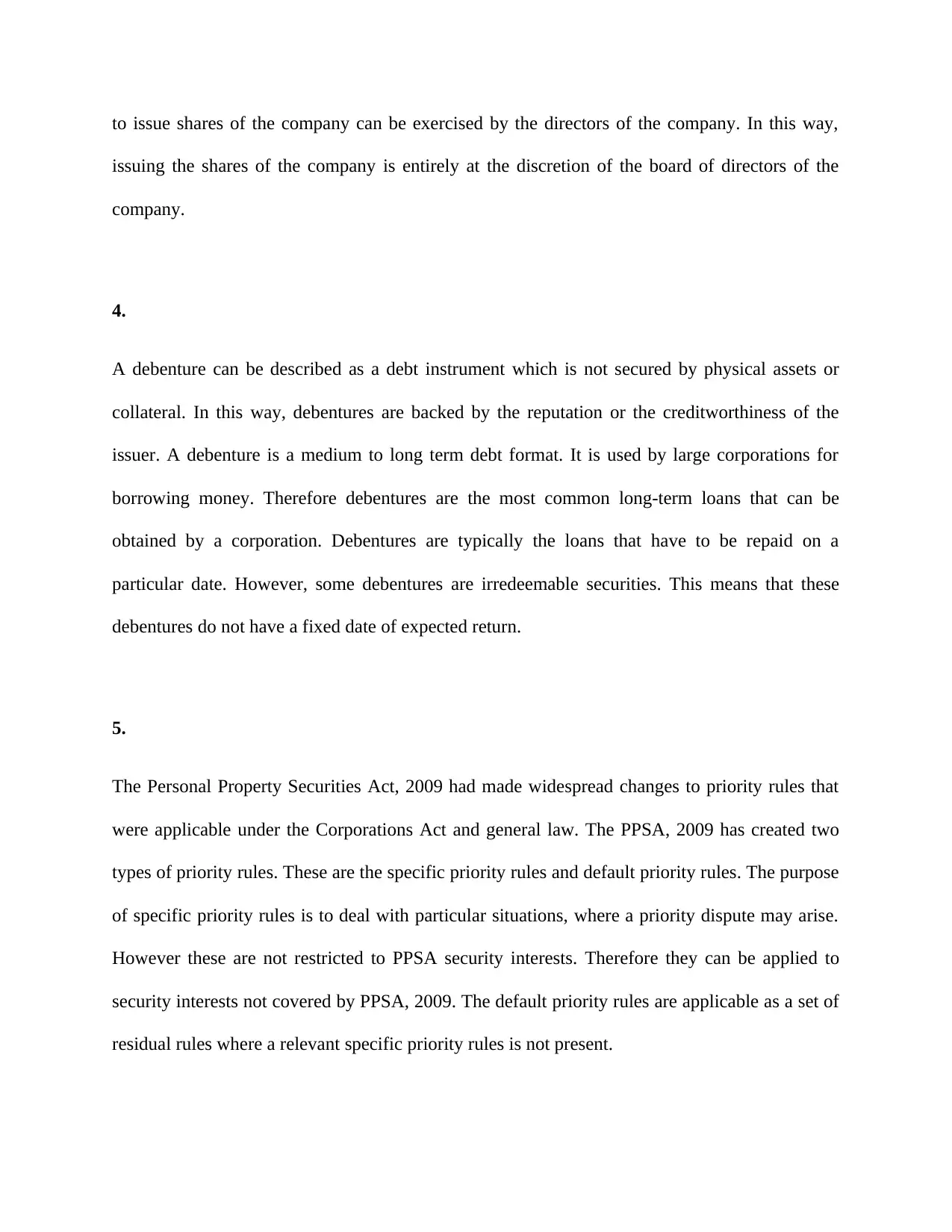
to issue shares of the company can be exercised by the directors of the company. In this way,
issuing the shares of the company is entirely at the discretion of the board of directors of the
company.
4.
A debenture can be described as a debt instrument which is not secured by physical assets or
collateral. In this way, debentures are backed by the reputation or the creditworthiness of the
issuer. A debenture is a medium to long term debt format. It is used by large corporations for
borrowing money. Therefore debentures are the most common long-term loans that can be
obtained by a corporation. Debentures are typically the loans that have to be repaid on a
particular date. However, some debentures are irredeemable securities. This means that these
debentures do not have a fixed date of expected return.
5.
The Personal Property Securities Act, 2009 had made widespread changes to priority rules that
were applicable under the Corporations Act and general law. The PPSA, 2009 has created two
types of priority rules. These are the specific priority rules and default priority rules. The purpose
of specific priority rules is to deal with particular situations, where a priority dispute may arise.
However these are not restricted to PPSA security interests. Therefore they can be applied to
security interests not covered by PPSA, 2009. The default priority rules are applicable as a set of
residual rules where a relevant specific priority rules is not present.
issuing the shares of the company is entirely at the discretion of the board of directors of the
company.
4.
A debenture can be described as a debt instrument which is not secured by physical assets or
collateral. In this way, debentures are backed by the reputation or the creditworthiness of the
issuer. A debenture is a medium to long term debt format. It is used by large corporations for
borrowing money. Therefore debentures are the most common long-term loans that can be
obtained by a corporation. Debentures are typically the loans that have to be repaid on a
particular date. However, some debentures are irredeemable securities. This means that these
debentures do not have a fixed date of expected return.
5.
The Personal Property Securities Act, 2009 had made widespread changes to priority rules that
were applicable under the Corporations Act and general law. The PPSA, 2009 has created two
types of priority rules. These are the specific priority rules and default priority rules. The purpose
of specific priority rules is to deal with particular situations, where a priority dispute may arise.
However these are not restricted to PPSA security interests. Therefore they can be applied to
security interests not covered by PPSA, 2009. The default priority rules are applicable as a set of
residual rules where a relevant specific priority rules is not present.
⊘ This is a preview!⊘
Do you want full access?
Subscribe today to unlock all pages.

Trusted by 1+ million students worldwide
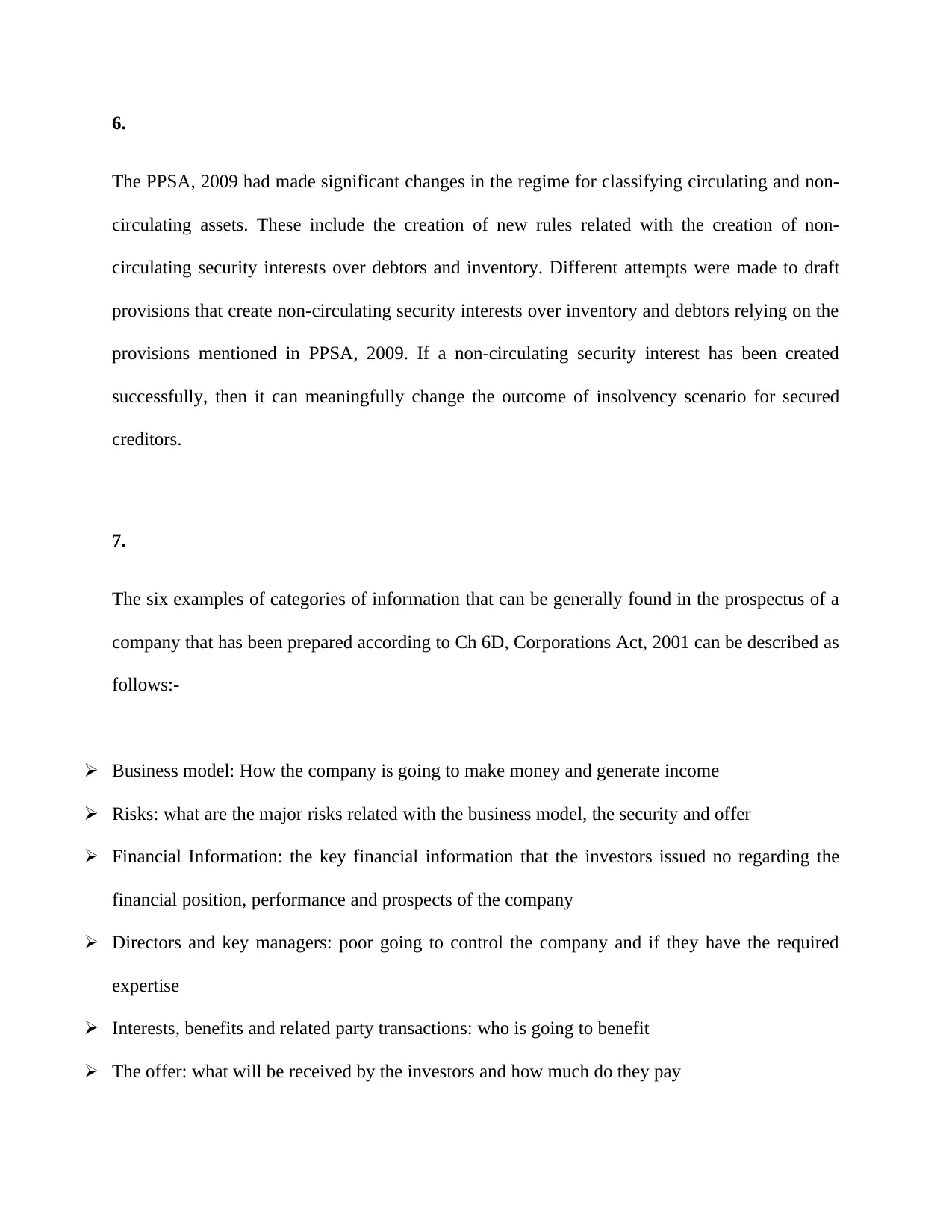
6.
The PPSA, 2009 had made significant changes in the regime for classifying circulating and non-
circulating assets. These include the creation of new rules related with the creation of non-
circulating security interests over debtors and inventory. Different attempts were made to draft
provisions that create non-circulating security interests over inventory and debtors relying on the
provisions mentioned in PPSA, 2009. If a non-circulating security interest has been created
successfully, then it can meaningfully change the outcome of insolvency scenario for secured
creditors.
7.
The six examples of categories of information that can be generally found in the prospectus of a
company that has been prepared according to Ch 6D, Corporations Act, 2001 can be described as
follows:-
Business model: How the company is going to make money and generate income
Risks: what are the major risks related with the business model, the security and offer
Financial Information: the key financial information that the investors issued no regarding the
financial position, performance and prospects of the company
Directors and key managers: poor going to control the company and if they have the required
expertise
Interests, benefits and related party transactions: who is going to benefit
The offer: what will be received by the investors and how much do they pay
The PPSA, 2009 had made significant changes in the regime for classifying circulating and non-
circulating assets. These include the creation of new rules related with the creation of non-
circulating security interests over debtors and inventory. Different attempts were made to draft
provisions that create non-circulating security interests over inventory and debtors relying on the
provisions mentioned in PPSA, 2009. If a non-circulating security interest has been created
successfully, then it can meaningfully change the outcome of insolvency scenario for secured
creditors.
7.
The six examples of categories of information that can be generally found in the prospectus of a
company that has been prepared according to Ch 6D, Corporations Act, 2001 can be described as
follows:-
Business model: How the company is going to make money and generate income
Risks: what are the major risks related with the business model, the security and offer
Financial Information: the key financial information that the investors issued no regarding the
financial position, performance and prospects of the company
Directors and key managers: poor going to control the company and if they have the required
expertise
Interests, benefits and related party transactions: who is going to benefit
The offer: what will be received by the investors and how much do they pay
Paraphrase This Document
Need a fresh take? Get an instant paraphrase of this document with our AI Paraphraser
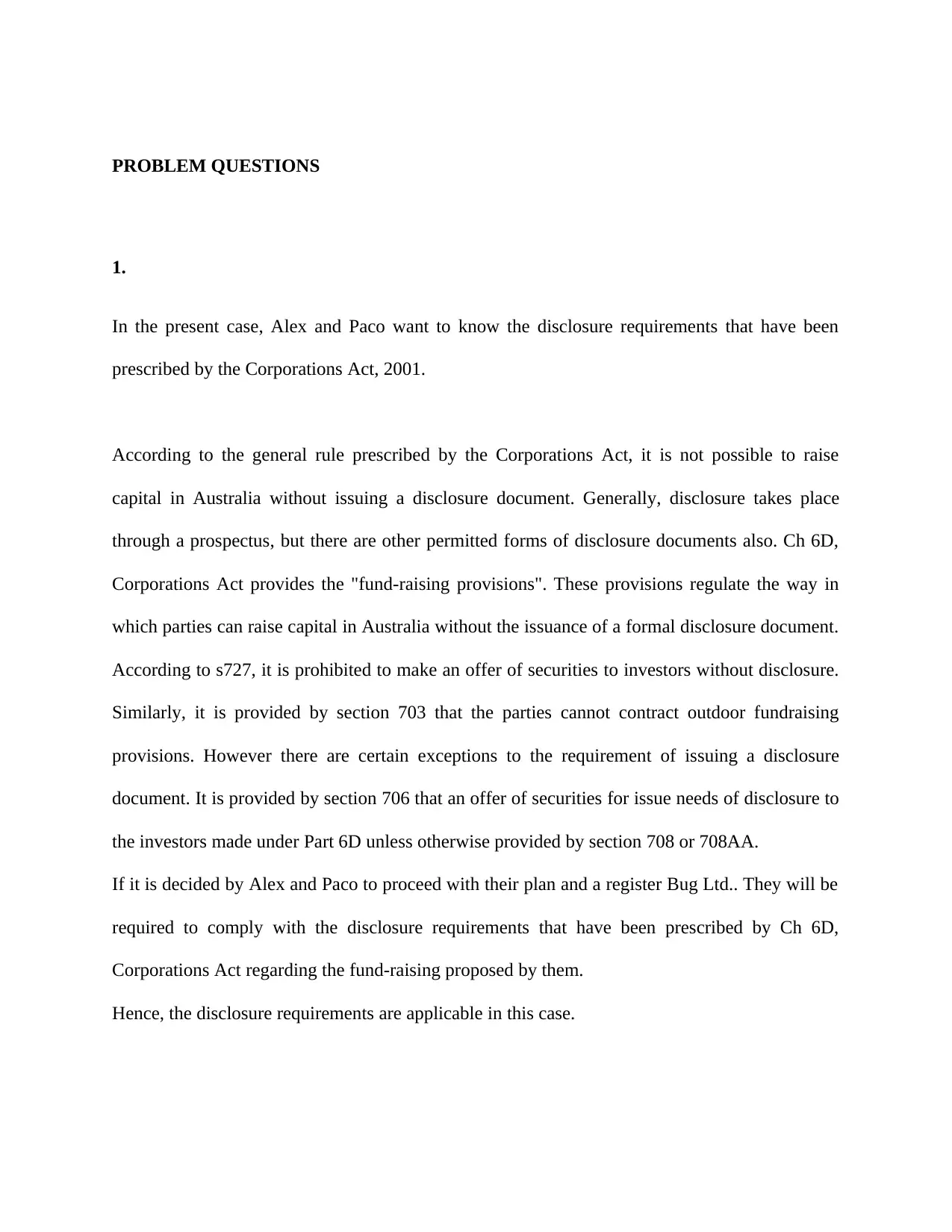
PROBLEM QUESTIONS
1.
In the present case, Alex and Paco want to know the disclosure requirements that have been
prescribed by the Corporations Act, 2001.
According to the general rule prescribed by the Corporations Act, it is not possible to raise
capital in Australia without issuing a disclosure document. Generally, disclosure takes place
through a prospectus, but there are other permitted forms of disclosure documents also. Ch 6D,
Corporations Act provides the "fund-raising provisions". These provisions regulate the way in
which parties can raise capital in Australia without the issuance of a formal disclosure document.
According to s727, it is prohibited to make an offer of securities to investors without disclosure.
Similarly, it is provided by section 703 that the parties cannot contract outdoor fundraising
provisions. However there are certain exceptions to the requirement of issuing a disclosure
document. It is provided by section 706 that an offer of securities for issue needs of disclosure to
the investors made under Part 6D unless otherwise provided by section 708 or 708AA.
If it is decided by Alex and Paco to proceed with their plan and a register Bug Ltd.. They will be
required to comply with the disclosure requirements that have been prescribed by Ch 6D,
Corporations Act regarding the fund-raising proposed by them.
Hence, the disclosure requirements are applicable in this case.
1.
In the present case, Alex and Paco want to know the disclosure requirements that have been
prescribed by the Corporations Act, 2001.
According to the general rule prescribed by the Corporations Act, it is not possible to raise
capital in Australia without issuing a disclosure document. Generally, disclosure takes place
through a prospectus, but there are other permitted forms of disclosure documents also. Ch 6D,
Corporations Act provides the "fund-raising provisions". These provisions regulate the way in
which parties can raise capital in Australia without the issuance of a formal disclosure document.
According to s727, it is prohibited to make an offer of securities to investors without disclosure.
Similarly, it is provided by section 703 that the parties cannot contract outdoor fundraising
provisions. However there are certain exceptions to the requirement of issuing a disclosure
document. It is provided by section 706 that an offer of securities for issue needs of disclosure to
the investors made under Part 6D unless otherwise provided by section 708 or 708AA.
If it is decided by Alex and Paco to proceed with their plan and a register Bug Ltd.. They will be
required to comply with the disclosure requirements that have been prescribed by Ch 6D,
Corporations Act regarding the fund-raising proposed by them.
Hence, the disclosure requirements are applicable in this case.
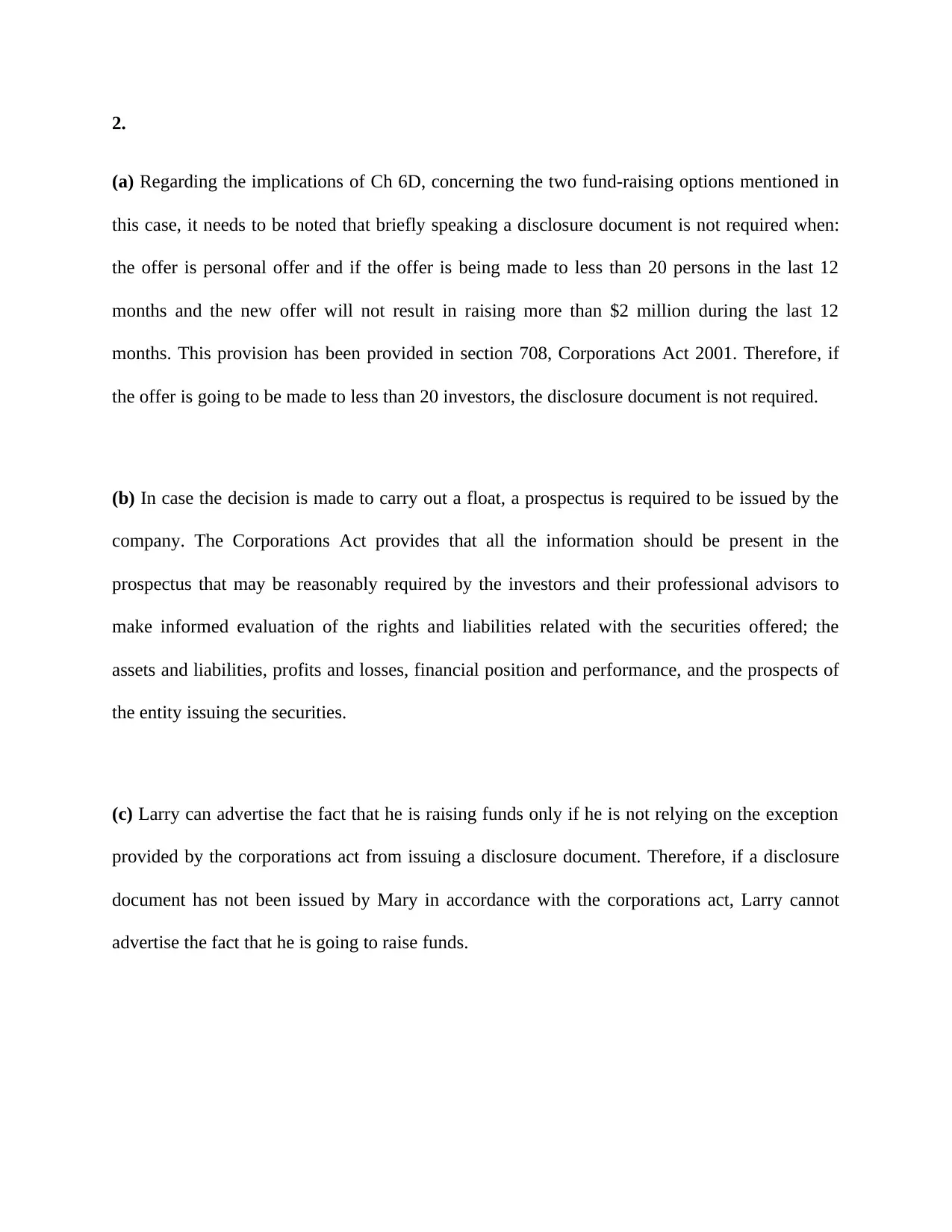
2.
(a) Regarding the implications of Ch 6D, concerning the two fund-raising options mentioned in
this case, it needs to be noted that briefly speaking a disclosure document is not required when:
the offer is personal offer and if the offer is being made to less than 20 persons in the last 12
months and the new offer will not result in raising more than $2 million during the last 12
months. This provision has been provided in section 708, Corporations Act 2001. Therefore, if
the offer is going to be made to less than 20 investors, the disclosure document is not required.
(b) In case the decision is made to carry out a float, a prospectus is required to be issued by the
company. The Corporations Act provides that all the information should be present in the
prospectus that may be reasonably required by the investors and their professional advisors to
make informed evaluation of the rights and liabilities related with the securities offered; the
assets and liabilities, profits and losses, financial position and performance, and the prospects of
the entity issuing the securities.
(c) Larry can advertise the fact that he is raising funds only if he is not relying on the exception
provided by the corporations act from issuing a disclosure document. Therefore, if a disclosure
document has not been issued by Mary in accordance with the corporations act, Larry cannot
advertise the fact that he is going to raise funds.
(a) Regarding the implications of Ch 6D, concerning the two fund-raising options mentioned in
this case, it needs to be noted that briefly speaking a disclosure document is not required when:
the offer is personal offer and if the offer is being made to less than 20 persons in the last 12
months and the new offer will not result in raising more than $2 million during the last 12
months. This provision has been provided in section 708, Corporations Act 2001. Therefore, if
the offer is going to be made to less than 20 investors, the disclosure document is not required.
(b) In case the decision is made to carry out a float, a prospectus is required to be issued by the
company. The Corporations Act provides that all the information should be present in the
prospectus that may be reasonably required by the investors and their professional advisors to
make informed evaluation of the rights and liabilities related with the securities offered; the
assets and liabilities, profits and losses, financial position and performance, and the prospects of
the entity issuing the securities.
(c) Larry can advertise the fact that he is raising funds only if he is not relying on the exception
provided by the corporations act from issuing a disclosure document. Therefore, if a disclosure
document has not been issued by Mary in accordance with the corporations act, Larry cannot
advertise the fact that he is going to raise funds.
⊘ This is a preview!⊘
Do you want full access?
Subscribe today to unlock all pages.

Trusted by 1+ million students worldwide
1 out of 29
Your All-in-One AI-Powered Toolkit for Academic Success.
+13062052269
info@desklib.com
Available 24*7 on WhatsApp / Email
![[object Object]](/_next/static/media/star-bottom.7253800d.svg)
Unlock your academic potential
Copyright © 2020–2026 A2Z Services. All Rights Reserved. Developed and managed by ZUCOL.